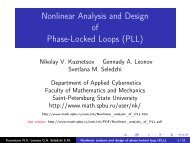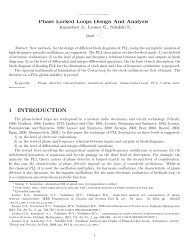Technical Sessions – Monday July 11
Technical Sessions – Monday July 11
Technical Sessions – Monday July 11
You also want an ePaper? Increase the reach of your titles
YUMPU automatically turns print PDFs into web optimized ePapers that Google loves.
HD-02 IFORS 20<strong>11</strong> - Melbourne<br />
� HD-02<br />
Thursday, 15:30-17:00<br />
Meeting Room 101<br />
Production Scheduling<br />
Stream: Scheduling<br />
Contributed session<br />
Chair: Sergio Maturana, Ingenieria Industrial y de Sistemas, P.<br />
Universidad Catolica de Chile, Casilla 306 Correo 22, Santiago,<br />
Chile, smaturan@ing.puc.cl<br />
1 - Metaheuristic Solution Approaches for the Open-pit<br />
Mine Production Scheduling Problem with Grade Uncertainty<br />
Amina Lamghari, Mining and Materials Engineering, McGill<br />
University, Frank Dawson Adams, Rm <strong>11</strong>3, 3450 University<br />
street, H3A 2A7, Montreal, Quebec, Canada,<br />
amina.lamghari@mail.mcgill.ca, Roussos Dimitrakopoulos<br />
We consider a stochastic version of the open-pit mine production scheduling<br />
problem. In this problem, the mineral deposit is represented as a threedimensional<br />
grid of blocks, and the metal content of the blocks is the source<br />
of uncertainty. The problem can be formulated as a two-stage stochastic program<br />
with recourse. We propose two metaheuristic solution approaches based<br />
on tabu search and variable neighborhood search. Numerical results are provided<br />
to indicate the efficiency of the proposed methods to generate very good<br />
solutions in reasonable computational times.<br />
2 - Operative Production Planning under Demand Uncertainty<br />
in the Context of the Automotive Industry with<br />
Rolling Horizons<br />
Stefan Kloepfer, CIM, Heinz Nixdorf Institute, Fürstenallee <strong>11</strong>,<br />
33102, Paderborn, Germany, stefan.kloepfer@hni.upb.de,<br />
Wilhelm Dangelmaier<br />
In order to achieve efficient production planning, the subtasks of lotsizing,scheduling<br />
and capacity assignment under demand uncertainty have to<br />
be solved simultaneously because of their interdependencies. To cope with<br />
this problem, we present a holistic 2-stage stochastic model with a time based<br />
aggregation scheme that reduces complexity at small loss of accuracy by integrating<br />
the concept of rolling horizons. Moreover,we show the benefit of using<br />
a stochastic model and elaborate on an approach for deriving realistic scenario<br />
sets in this context of long term customer-supplier relationships.<br />
3 - Minimising the Cycles Traversed on a Unidirectional<br />
Cyclical Picking Line<br />
Jason Matthews, Department of Logistics, University of<br />
Stellenbosch, South Africa, 14855054@sun.ac.za, Stephan<br />
Visagie<br />
A real life order pick operation making use of cyclical picking lines used by Pep<br />
Stores Ltd, South Africa, is considered. Multiple pickers walk in a clockwise<br />
direction around a conveyor belt picking from fixed bin locations. The problem<br />
of sequencing orders for these pickers is discussed. A strong lower bound on<br />
the number of cycles needed for a wave of picking is established. Results on a<br />
dynamic solution approach to the real life problem are presented<br />
4 - Integrating Planning and Scheduling Sawmill Operations<br />
Sergio Maturana, Ingenieria Industrial y de Sistemas, P.<br />
Universidad Catolica de Chile, Casilla 306 Correo 22, Santiago,<br />
Chile, smaturan@ing.puc.cl, Mauricio Varas<br />
A recurring problem faced by many firms is how to plan and schedule their<br />
operations. Although both stages are required, frequently they are difficult to<br />
integrate taking into account the uncertainty faced by the firm. An "optimal’<br />
plan might result in a suboptimal schedule due to unforeseen changes. We<br />
present a preliminary study on integrating planning and scheduling of operations<br />
at a sawmill using an optimization model for the planning stage, and a<br />
simple heuristic for the scheduling stage. Monte-Carlo simulation is used to<br />
study the properties of the solutions generated by the approach.<br />
98<br />
� HD-03<br />
Thursday, 15:30-17:00<br />
Meeting Room 102<br />
Travel Behaviour 3<br />
Stream: Travel Behaviour<br />
Invited session<br />
Chair: John Rose, The University of Sydney, NSW 2006, Sydney,<br />
Australia, JohnR@itls.usyd.edu.au<br />
1 - Measuring the Impact of Individuals’ Perceptions on<br />
their Transport Mode Choice<br />
Aurélie Glerum, Transport and Mobility Laboratory, École<br />
Polytechnique Fédérale de Lausanne (EPFL), Lausanne,<br />
Switzerland, aurelie.glerum@epfl.ch, Bilge Atasoy, Michel<br />
Bierlaire<br />
This research aims at analyzing the impact of individuals’ perceptions on their<br />
transport mode preferences through an integrated choice and latent variable<br />
model. Here perceptions are measured through adjectives describing several<br />
different transport modes. The adjectives were freely reported by respondents<br />
of a survey conducted in low-density areas. They build a new type of data<br />
consisting of words that can be classified according to a perception scale and<br />
introduced in a discrete choice model as measurement equations of a latent<br />
perception of a transport mode.<br />
2 - Profiling Public Events from Mobility Data<br />
Francisco Pereira, SMART/ITS, MIT, 77 Mass Ave. Room<br />
1-249, 02139, Cambridge, MA, United States, camara@dei.uc.pt<br />
This paper describes a methodology for identifying public home distributions in<br />
planned special events. We analyze a massive dataset of localized cell-phone<br />
records to infer crowd traces. A neural network model then predicts crowd<br />
home distributions at the zipcode area level. Experiments based on 52 events<br />
in the city of Boston show an RMSE of 4.89% in the prediction for high demand<br />
areas. This work demonstrates the value of mobility data for the support<br />
of travel demand management and ultimately to a more responsive city without<br />
compromising critical issues such as privacy or security.<br />
� HD-04<br />
Thursday, 15:30-17:00<br />
Meeting Room 103<br />
Carbon Emissions and Supply Chains<br />
Stream: Supply Chain Management<br />
Invited session<br />
Chair: Tarkan Tan, Industrial Engineering, Eindhoven University of<br />
Technology, Den Dolech 2, Pav F-07, 5612AZ, Eindhoven,<br />
Netherlands, t.tan@tue.nl<br />
1 - Effect of Carbon Emission Regulations on Transport<br />
Mode Selection in Supply Chains<br />
Tarkan Tan, Industrial Engineering, Eindhoven University of<br />
Technology, Den Dolech 2, Pav F-07, 5612AZ, Eindhoven,<br />
Netherlands, t.tan@tue.nl, Kristel Hoen<br />
We investigate the effect of two regulation mechanisms to drive down carbon<br />
emissions on the transport mode selection decision: an emission cost and an<br />
emission constraint. We use an accurate calculation method to determine the<br />
carbon emissions and incorporate them explicitly in our model. Our results<br />
show that introducing an emission cost for freight transport, e.g. via a market<br />
mechanism such as cap-and-trade, will not result in large emission reductions.<br />
2 - Carbon-optimal Supply Chains<br />
Charles Corbett, UCLA Anderson School of Management, <strong>11</strong>0<br />
westwood plaza, box 951481, 90095-1481, Los Angeles, CA,<br />
United States, charles.corbett@anderson.ucla.edu, Felipe Caro,<br />
Tarkan Tan, Rob Zuidwijk<br />
In this paper we explore the differences between making a supply chain carbonneutral<br />
by offsetting all emissions vs. making it carbon-optimal by inducing all<br />
parties to invest appropriately in reducing GHG emissions. We examine conditions<br />
under which first-best can and cannot be achieved, and examine various<br />
decentralized outcomes.




